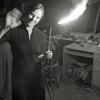Scout Niblett, "The Calcination of,..."
 The list of singer-songwriters as raw as Emma Louise "Scout" Niblett is very short. Names like P.J. Harvey and Patti Smith come to mind when thinking of her and, in some ways, both of them are more suitable reference points than the grunge bands Scout has named-checked as her influences. On The Calcination of Scout Niblett she sounds as severe as she ever has and starker, too. But, if Scout began her career under the wings of Nirvana and Sonic Youth, she's long since graduated to something more original, less obvious, and much, much more ominous.
The list of singer-songwriters as raw as Emma Louise "Scout" Niblett is very short. Names like P.J. Harvey and Patti Smith come to mind when thinking of her and, in some ways, both of them are more suitable reference points than the grunge bands Scout has named-checked as her influences. On The Calcination of Scout Niblett she sounds as severe as she ever has and starker, too. But, if Scout began her career under the wings of Nirvana and Sonic Youth, she's long since graduated to something more original, less obvious, and much, much more ominous.
When "Just Do It!" begins I'm immediately reminded of Neil Young, but not because Scout is gravitating towards her folk influences these days. Her attitude and sound is too introspective for punk rock, too heavy for folk, and too atmospheric for grunge, but she undeniably draws from all of these influences and has a fondness, like Young, for fluctuating between all of them, sometimes in the same song. The album begins with a gnarly and fuzzed-out melodic hook, but it quickly goes quiet as Niblett sings "And the voices said just do it / And I think I will" in a cocky, almost angry snarl. What exactly she intends to do is left a little ambiguous, but I get the sense it is meant as a threat, perhaps to herself. With her trademarked big drum sound and loud-quiet dynamic in hand, Scout embarks on a quest to set herself on fire in a ritual act of purification. But, in accomplishing this end she does almost nothing to her sound that we haven't already heard. In fact, portions of The Calcination are a little too familiar. So, let me get this out of the way right away: Scout's walking over a lot of the same ground she covered on 2007's This Fool Can Die Now. She's toying with her approach a little bit and bringing back elements from Kidnapped by Neptune and I Am, but all three of those records have so much in common that there's little point in debating the minituae that distinguishes them stylistically. Scout's stubborn determination to stay basically the same is a little frustrating, but as other writers have pointed out she sounds so good that changing anything might be equally frustrating, maybe even detrimental.
That said, The Calcination is much darker than This Fool Can Die Now and a little more satisfying for it. It is easily her most foreboding record. If Scout hasn't changed her sound much, she's made up for it a little by letting her teeth show more than usual. There's no semi-sweet or awkward duets and no video of Scout singing into a hair brush or prancing about on the beach with a skeleton-clad Will Oldham. Instead, Scout delivers a cover lit by the welding torch she is holding, a booklet filled photographs of stones, and lyrics like "Welcome to my self-made sweat box / this is where I take it all off / Sweat / I've got to sweat it out / Cook / I'll cook those monsters out / Because I ain't getting out of here / until my, until my soul appears." There are no playful or cute interludes anywhere on the record, so there's none of the relief that songs like "Dinosaur Egg" or "Your Beat Kicks Back Like Death" provided. Distilled or calcinated or completely stripped down, Scout is more aggressive and serious and probably a little more troubled, too. Her guitars loom and stab where they once danced and rocked out and her drums snap and pound where they were sometimes played like a toy. Whatever has happened to Scout since we last heard from her, it has added a substantial amount of menace to her words and playing. She's become more concise and that's made her more aggressive and fearsome.
The album ends with "Meet and Greet," which sounds like it could be the soundtrack to a showdown in some anachronistic western. A dissonant, casually played melody and some light, atmospheric percussion make up most of the song, together sounding like a thunderstorm on the horizon. Scout sings in a challenging voice throughout it, intimating that some kind of resolution might be on the horizon, too. But, whatever she means when she sings "Jupiter, father of gods, I summon you to me / When are you gonna learn to play that thing?" it sounds more like a provocation than an invitation or a prayer. Scout doesn't ultimatey provide a resolution for all the tension she generates on The Calcination. All we get at the end of "Meet and Greet" is a volcanic splash of distorted guitar and a rumbling, sustained tone. While she has always written heavy, honest, and intimidating music, Scout has never sounded as bleak and frightful as she does here.
samples:



